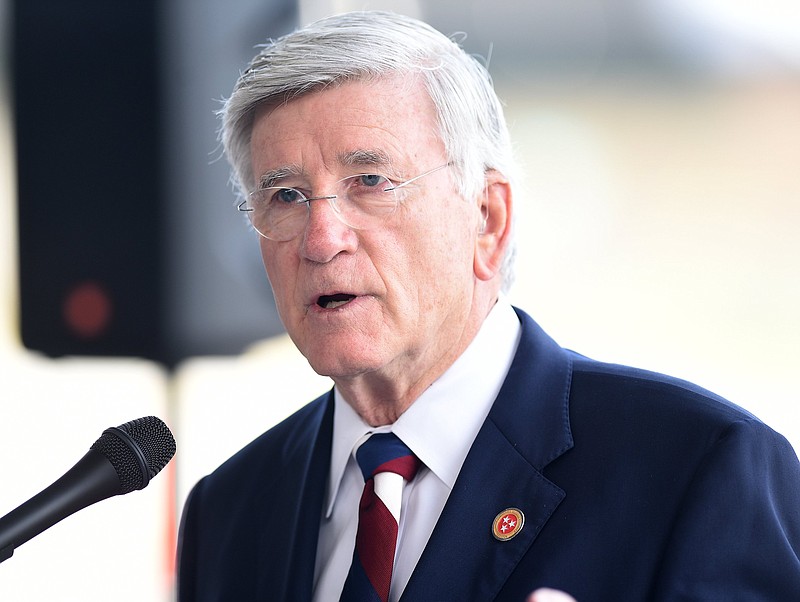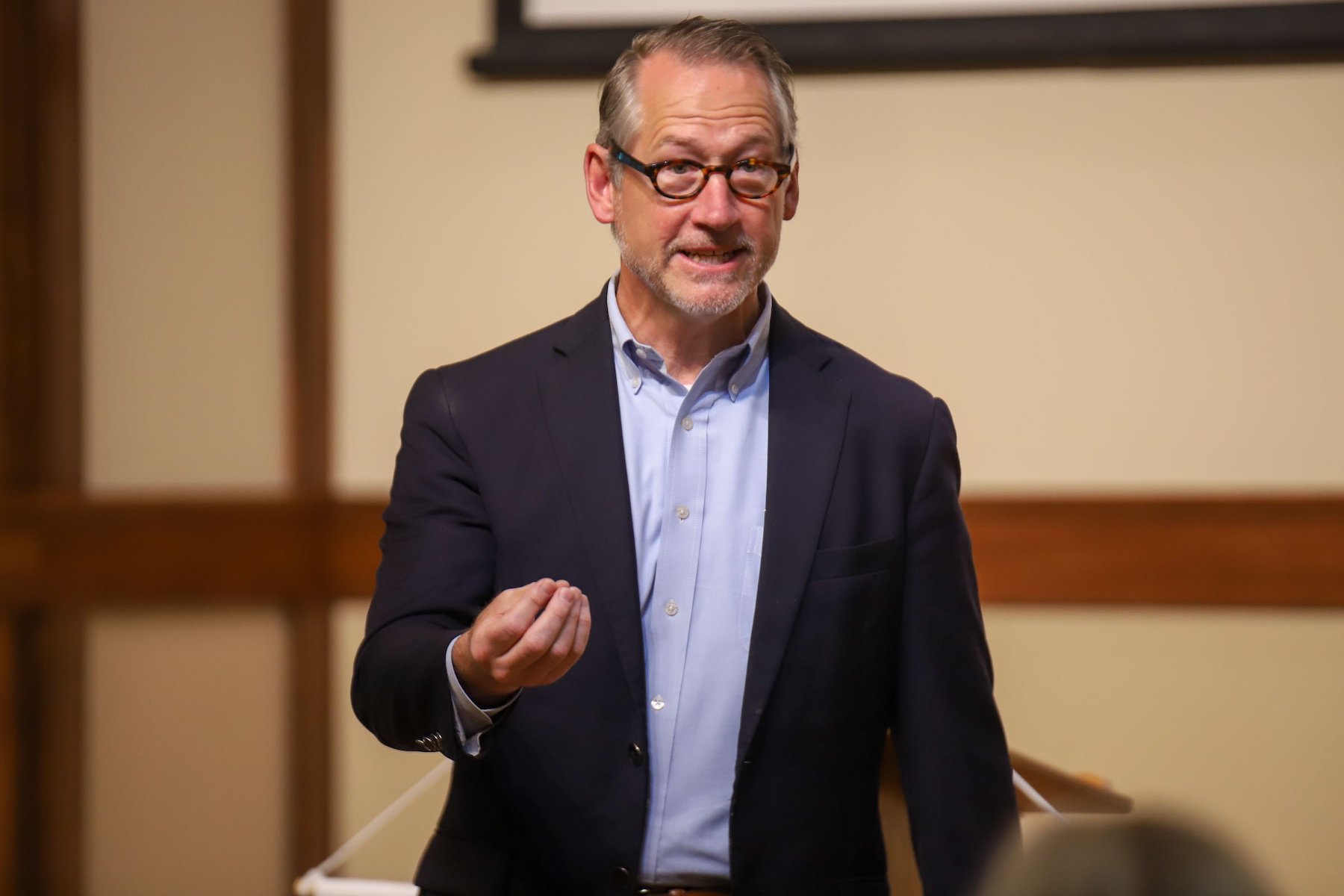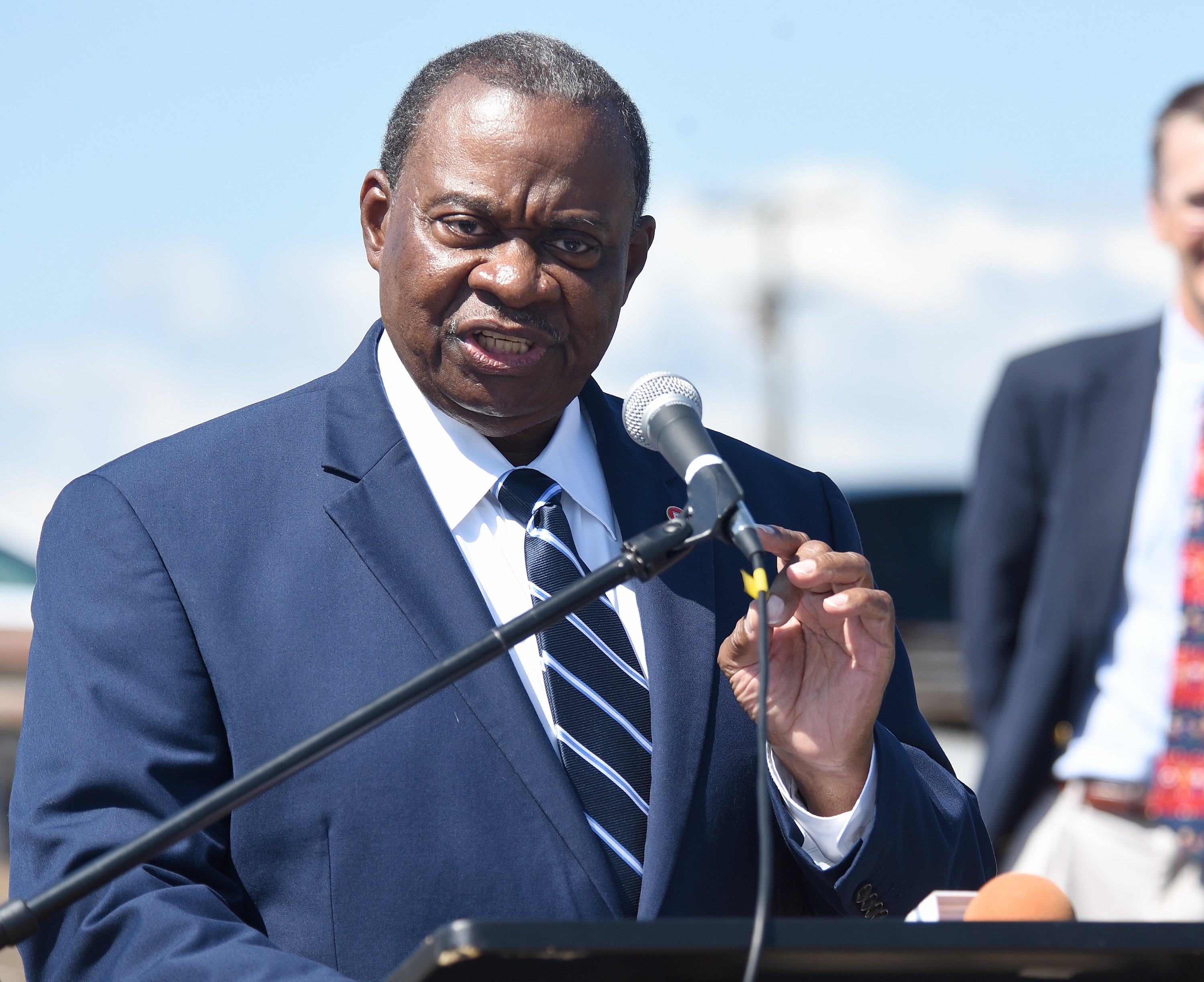Buoyed by billions of dollars in new investments and extra stimulus funding from Uncle Sam, Tennessee is sitting on budget surpluses of more than $1 billion and a strong balance sheet for future borrowing.
But Hamilton County's state senators are wary about spending one-time money on ongoing programs.
Worried that local business leaders might try to seek part of Tennessee's budget reserves, state Sen. Todd Gardenhire, R-Lookout Mountain, showed up Tuesday at a Chattanooga Chamber of Commerce event sporting a tie displaying the Grinch.
"I wore this today because I know somebody here is going to ask for money," Gardenhire told more than 100 Chamber of Commerce and community leaders during a legislative breakfast Tuesday at the headquarters of BlueCross BlueShield of Tennessee.
"I think one of the biggest challenges we're going to have in the Legislature is how you allocate your money and balance your expenses with recurring revenue. Everybody wants a tax cut, but if we're going to provide the services on a recurring basis to the citizens of this state, we've got to be careful how we spend our money and not spend one-time money on recurring projects."
State Sen. Bo Watson, R-Chattanooga, said the state is facing inflationary wage pressures to keep enough qualified employees doing the work of state government and to fund increasingly expensive road and building projects.
Watson said state revenues are rising at record highs, but inflation is absorbing most of that increase. The state projects that its tax collections will grow 7.2% to 7.5% in the current fiscal year, which is double what the state normally sees for tax collection gains.
"Over the past two or three years, we have embarked on the largest capital improvement projects that the state has ever been engaged in," Watson said. "Unfortunately, many of those capital projects have been influenced by rising building costs. The challenge of inflation is that it can appear to give you a rosier condition than really exists and it can make things cost more than what was originally budgeted."
In the Department of Children's Services, Watson said the state has "significant challenges in just providing the services that the state has guaranteed," and he said Tennessee is going to have to make "a substantial investment in our state employees just to stay competitive in the marketplace."
Gardenhire said wage increases are also needed for corrections and caregivers, but raising state pay has already cost the state more than $2 billion.
Watson said major construction projects for roads and buildings are increasing and the state will need to look at how and what it funds for transportation, especially as electric vehicles begin to replace gas-powered cars and trucks. Tennessee currently relies almost entirely on its state's 26-cents-per-gallon gasoline and 27-cents-per-gallon diesel fuel tax to pay for the state portion of highways and roads across Tennessee.
The federal tax on gasoline has not been raised since 1983, but in 2017 Tennessee raised the gas tax by 6 cents and raised the diesel tax by 10 cents a gallon under then Gov. Bill Haslam's Improve Act.
"The problem with inflation has eaten away at all of the projects and the projects that we thought we were going to be able to do with the Improve Act and there's just not enough funding in the pipeline," Watson said. "We'll get to (needed highway projects), but it might be 50 to 60 years before we get to all of them."
Last week, Tennessee Gov. Bill Lee proposed a plan to authorize public-private partnerships to build and operate new dedicated toll lanes that are owned and operated by private companies in highly congested areas throughout the state.
Lee said such privately funded highway improvements were needed to help address growing traffic congestion on many of the state's highways. Watson said he is still evaluating the express lane proposal, but he said he thinks the other part of Lee's highway funding proposal to triple the annual fees charged on electric vehicles from $100 a year to $300 a year is probably excessive and won't be adopted.
"A lot of people's eyes bugged out when they saw that increase, and that is what we consider just a placeholder to make sure we pay attention to it," Watson said.
The proposed $300 fee would be the highest for any state in the country, but Watson said some increase will be needed to keep up with rising costs and to treat EV owners similarly to those operating gas-powered cars.
Gardenhire said his 10th Senate district is due to get nearly $1 billion of interstate highway upgrades stretching from Volkswagen Drive in Ooltewah through Hamilton and Marion counties to the Alabama line.
"It's more than any other district in the state -- that's the good news," Gardenhire said. "The bad news is that this has been neglected for decades and it needs a lot of work. Once we get those bottlenecks redone, traffic should flow a lot easier."
Gardenhire said 70% of the nation's east-west traffic comes through Tennessee and traffic jams are worsening.
State Rep. Greg Martin, R-Hiixson, said transportation is a growing concern as traffic problems continue to grow.
"The fact that you can get to Tennessee (in a day's drive) from two-thirds of the country, I think you're going to see a lot of conversation around transportation and perhaps some different ways of thinking about how we tackle that," Martin said.
Highway and road congestion are also top public concerns in Chattanooga, although Watson conceded there are no easy fixes to relieve the traffic problems.
"If adding more lanes was the solution, you would be able to breeze through Atlanta and Houston," Watson said
State Rep. Yusuf Hakeem, D-Chattanooga, said education also remains a top concern among voters in his district, and he said he hopes the state can do more to improve early childhood education and kindergarten-through-third-grade programs to help more students learn to read at grade levels by the third grade.
To comply with the state's third-grade retention law, school districts are required to hold back students who aren't meeting grade-level literacy expectations. That could require as many as 30% of the third graders in Hamilton County schools to attend summer school next year.
Watson said the new funding plan known as the Tennessee Investment in Student Achievement will provide more money to enhance pre-K to third-grade education. Hamilton County is due to get about $47 million of additional state funding under the plan, Martin said.
Contact Dave Flessner at dflessner@timesfreepress.com or 423-757-6340. Follow him on Twitter @DFlessner1.


